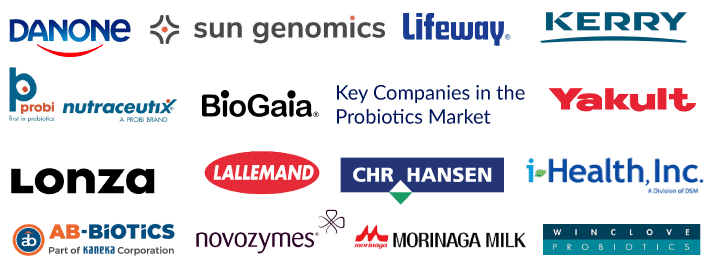Probiotics: How Market Dynamics are Evolving with the Ongoing Development?
Mar 29, 2023
Table of Contents
In recent years, Probiotics and prebiotics products have gained intense development and attention from the scientific, researchers, and healthcare giants due to their beneficial roles in maintaining human health. Several clinical studies have demonstrated a positive effect of probiotics on gastrointestinal diseases (e.g., irritable bowel syndrome, gastrointestinal disorders, elimination of Helicobacter, inflammatory bowel disease, diarrhoeas) and allergic diseases (e.g., atopic dermatitis). Similarly, several clinical studies are going on to assess the effectiveness of probiotics in treating various diseases such as obesity, type 2 diabetes, and non-alcoholic fatty liver disease, among others.
Similarly, probiotics have acquired intense public acceptance as a functional food. Probiotics are found in many foods and drinks items yogurt, miso, tempeh, kefir, pickled vegetables, sauerkraut, kimchi, buttermilk, and others. Dairy products, particularly yogurt, are the most important method to deliver the probiotic bacteria. Similarly, probiotic supplements can be taken as dietary supplements in various forms, such as tablets, powders, pills, liquids, and capsules. Each of the supplements contains billions of probiotics. With the growing awareness, more and more people are taking probiotics for weight management, better skin, gut health and immunity demands, mood/stress, and feminine needs. To fulfill various demands, several major companies are actively working in the probiotics market to cater to different needs. Similarly, several of the companies have invested heavily in R&D activities related to probiotics products.
Downloads
Click Here To Get the Article in PDF
Recent Articles
What are Probiotics?
Probiotics are live and healthy microorganisms (bacteria and yeasts), similar to beneficial microorganisms present in our body, to prevent certain illnesses and promote gut health. These are considered non-pharmacological methods to prevent and treat various health conditions associated with digestive diseases and urinary tract infections, boost the immune system, and reduce inflammation and allergies. Various different types of prebiotics are available in the market to stimulate the growth of different indigenous gut bacteria With probiotics being both strain and disease-specific, it is crucial to identify the strains that produce the best outcome for different ailments and achieve the most optimal results.
Probiotics work on different mechanisms of action. They can produce antimicrobial substances, regulate the immune response, reduce the risk of developing an allergy, and improve the function of the intestinal mucosal barrier. Moreover, some of the probiotics can increase the stability or promote the recovery of the commensal microflora, modulate the expression of host genes, release functional proteins such as lactase or natural enzymes, and decrease the adhesion of pathogens.
Probiotics – Major Products Segmentation
Probiotic products can be subdivided into various categories. Based on the ingredient types, it is segmented as Bacteria and Yeast. Similarly, as per the product type, it is classified as functional food and beverages, dietary supplements, and animal feed. As per DelveInsight, based on the product type segment of the probiotics market, the functional food and beverages category is projected to register significant growth in revenue in the overall probiotics market in the upcoming years.
Functional Food and Beverages are considered safe, cheap, and capable products for preventing microbial infection, which enhances consumer trust and drives their demand among the consumer. They have a widener acceptance among consumers. Moreover, the probiotics in functional food and beverages are considered to reduce the risk of cancer, cardiovascular diseases, diabetes, and some allergic reactions. It also improves the lactose digestion process. In the case of elderly people, probiotics, if taken in an adequate amount, can reduce the risk of catching a cold and flu.
Probiotics Market Dynamics
According to the European Federation of Crohn’s and Ulcerative Colitis Associations, around 10 million people worldwide were estimated to suffer from inflammatory bowel disease (IBD) in 2022. Inflammatory bowel disease (IBD) is a chronic intestinal disease associated with the inflammatory gastrointestinal tract and microbiome dysbiosis.
As per DelveInsight, the total prevalent population of Crohn’s Disease in 7MM was estimated to be ~1,621,000 cases in 2022, and the number of cases is expected to increase during the study period (2019–2032). Moreover, in 2022, there were 2,787,000+ diagnosed cases of IBD in the 7MM. The United States observed the highest number of diagnosed prevalent cases of IBD. There were approximately 1,349,000 diagnosed cases of IBD in the US. In the European region, the total prevalent cases of Inflammatory Bowel Disease are increasing. In 2022, there were approximately 1,659,000 prevalent cases in the EU4 countries. Similarly, in the UK, there were ~363,000 prevalent cases of IBD in 2022. Similarly, in Japan, about 331,000 cases of IBD were registered in 2022, which makes up around 8-9% of the total IBD cases in the 7MM. Out of all the prevalent cases in Japan, ~70-80% are diagnosed with prevalent cases of IBD. The rising number of cases is adding a burden to the healthcare system. The growing prevalence of IBD and other gastrointestinal disorders immensely stimulates the demand for probiotics.
Probiotics are a promising intervention for improving digestive health by stimulating the healthy growth of gut bacteria. Probiotics are anticipated to positively benefit IBD remission and prevention, particularly for ulcerative colitis (UC). Several studies have shown that certain probiotic bacteria can prevent or minimize intestinal inflammation in some animal models. Similarly, some Clinical evidence has demonstrated beneficial effects. Probiotics are observed to be beneficial due to multiple mechanisms: stimulation of anti-inflammatory cytokines, inhibition of inflammatory cytokines, strengthening of the intestinal barrier, and antagonistic action on pathogens.
Moreover, the increasing usage of probiotics in sports is another factor driving the probiotics market growth. Intense exercise lead to a decrease in the performance of athletes. Athletes undergo strenuous and prolonged exercise that stresses the GI tract and raises the risk for several digestive issues linked to the disturbed gut microbiota, such as abdominal cramping, acid reflux (heartburn), nausea, vomiting, diarrhea, and intestinal permeability that may lead to systemic endotoxemia. Probiotics promote health, exercise adaptation, and performance in athletes. Several major companies are active in the probiotics market to grab the market share. Moreover, the strategic steps, including developing and launching probiotics specifically for use in sports by the key companies, are also expected to impact the Probiotics Market growth positively.
Overall, in the coming years, the demand for probiotics is anticipated to grow owing to the rise in the number of cases of inflammatory bowel disease, greater awareness about the benefits of Probiotics, and active participation of companies in new product development and the launch. However, safety issues associated with probiotics and challenges associated with applying probiotic cultures in functional foods may restrain the market growth for probiotics. Moreover, there is a need for much broader studies to find the limitation and the knowledge of the effectiveness and safety of probiotic therapies for IBD.
Probiotics Market – Regional Market Assessment
Among all the regions, North America is anticipated to hold the largest share of the global Probiotics market in the coming years. Some of the key factors such as the increasing demand for Probiotics in the region owing to the rising prevalence of various gastrointestinal disorders among the population, increasing consumer demand for fortified foods, presence of key players in the region, increasing product launches, rising personal disposal income, and others will contribute to the growth of the probiotics market in North America.
One of the prominent factors supporting the growth of the North American probiotics market is the extensive consumption of probiotics by people for maintaining digestive health owing to the growing risk for various digestive problems such as inflammatory bowel disease (IBD), Gastroesophageal reflux disease (GERD), peptic ulcers, constipation, diarrhea, pancreatitis, and others. As per the CDC, about 3 million people were living with IBD in the United States in 2021. Around 80,000 children were estimated to suffer from IBD in the US in 2022. The rising disposable personal income is another factor anticipated to bolster the growth of the probiotics market in the region. The rising personal income allows people to spend more on health-promoting products such as probiotics, which are highly beneficial for gut health.
Key Players in the Probiotics Market
Some of the key companies operating in the probiotics market include Danone, Nestle, BioGaia, Yakult Honsha Co., Ltd., Probi, Lifeway Foods, Inc., Kerry Inc., Chr. Hansen Holding A/S, Arla Foods amba, Lepicol, Lallemand Inc., Novozymes A/S, Winclove Probiotics, MORINAGA MILK INDUSTRY CO., LTD., Lonza, SUJA LIFE, LLC, i-Health, Inc., AB-Biotics, S.A., Sun Genomics, MORINAGA MILK INDUSTRY CO., LTD., and others. Owing to the rising awareness and the growing demand, several major companies are expected to enter the probiotics market in the coming years.

Recent Developmental Activities in the Probiotics Market
- In September 2022, Nestle’s probiotic brand Garden of Life announced the launch of two new probiotics for supporting kids’ growth and immune health in China.
- In December 2021, EZZ Life Science Holdings announced the launch of two digestive health products EZZ Biotic EnGastro Capsule and EZZ Biotic HHP Support Probiotic that is intended for treating diarrhea and reducing symptoms of medically diagnosed Irritable Bowel Syndrome (IBS).
- In September 2020, Lonza launched its first Probiotic Ingredient for Sports Nutrition in North America named TWK10® probiotic. TWK10® strain is the next generation of probiotics which is scientifically proven to effectively modulate gut microbiota for sports endurance and performance benefits.
Probiotics Market – Future Analysis and Perspective
Globally, the demand for probiotics products is increasing significantly as more and more people become aware of the benefits of probiotics for gut health, immunity, and overall wellness. The probiotics products market is also increasing due to the increasing prevalence of IBD linked with population aging and lifestyle changes. Similarly, the intense recent developments of activities by the pharma and biotech giants in microbiome science are creating a new frontier in the probiotics and prebiotics market. Moreover, manufacturers are expanding product portfolios and diversifying across different segments of probiotics ingredients and applications. As per DelveInsight, owing to the ongoing developments, the global probiotics market is expected to grow at a CAGR of 7.66% during the forecast period from 2022 to 2027. Currently, several potential probiotics products based on novel types, mechanisms, and applications are under evaluation and hold the potential to transform the nutritional and healthcare applications of probiotics in the coming years. Similarly, favorable government policies across different regions toward probiotics products are anticipated to play a crucial role in the growth of probiotics market.

Downloads
Article in PDF



